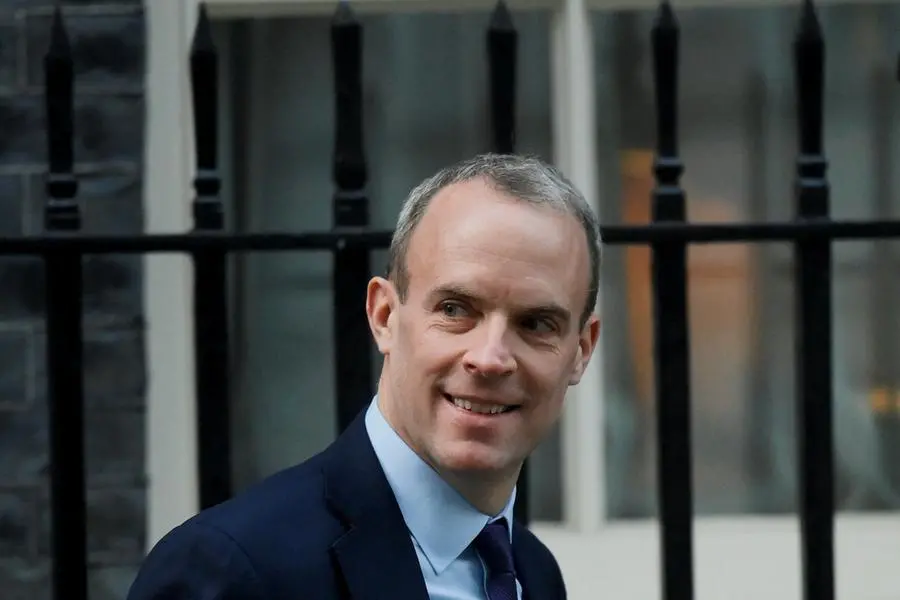PHOTO
LONDON - Britain is on the cusp of a deal with the European Union to tackle trade and political disruption in Northern Ireland caused by Brexit, Deputy Prime Minister Dominic Raab said on Sunday, but it is unclear whether that will satisfy eurosceptic critics.
More than a year of stop-start and sometimes rancorous negotiations between London and Brussels on an overhaul of the 2020 EU exit deal look to be coming to a conclusion, perhaps as early as Monday, with Prime Minister Rishi Sunak saying he was "giving it everything" to get a deal done.
"We're on the cusp, we've made great progress, we're not there yet," Raab told the BBC.
Sunak is looking to succeed in negotiations where his predecessors Boris Johnson and Liz Truss failed, but the push comes at the risk of swamping his domestic priorities as he looks to overturn a huge opinion poll deficit for the ruling Conservative Party ahead of a national election expected next year.
Even if agreed with Brussels in the coming days, the announcement of a deal is likely to be only the start.
Key players in Northern Ireland have set a high bar for the kind of deal they would support and Sunak's own Conservatives are still riddled with the divisions over Brexit that have at times paralysed British politics since the country's 2016 vote to leave the EU.
As part of its exit agreement, Britain signed an accord with Brussels known as the Northern Ireland Protocol to avoid imposing politically contentious checks along the 500-kilometre (310-mile) land border with EU member Ireland.
But the protocol effectively created a border for some goods moving from Britain because it kept Northern Ireland in the EU's single market for goods.
That has also disrupted the delicate political balance in Northern Ireland, preventing the formation of a power-sharing government set out by a 1998 peace agreement that mostly ended three decades of sectarian violence in the province.
In an interview with the Sunday Times, Sunak said the shooting of a police officer in Northern Ireland last week was a reminder of the fragility of the situation there.
TRADE TENSIONS
Raab said the deal would address trade tensions by easing the physical checks on goods that were demanded by the EU under the original agreement.
He also said the deal hoped to address concerns that the EU can set rules for Northern Ireland that cannot be influenced by the region's voters and politicians.
"If there any new rules that would apply in relation to Northern Ireland, it must be right that there's a Northern Irish democratic check on that," he said.
But, he stopped short of saying European courts would no longer have a say in Northern Ireland. That has been a key demand of the pro-British Democratic Unionist Party (DUP), which is currently refusing to enter a new power-sharing arrangement in Northern Ireland.
The DUP has set out seven tests for any deal. The Sunday Times said Sunak was confident the deal met those conditions, but that DUP party leader Jeffrey Donaldson was "minded to reject the deal".
Without DUP approval, Northern Ireland could remain without a devolved government, meaning one of the main aims of Sunak's renegotiation has failed.
A eurosceptic contingent of the Conservative Party is likely to take its lead from the DUP's final verdict, raising the risk that Sunak's party fractures and his agenda on the economy, and health and immigration reform is derailed.
Asked whether parliament would get a vote on approving the deal, Raab said lawmakers would have an opportunity to express themselves, but did not explicitly promise a vote.
That drew a sharp warning from lawmaker Mark Francois, head of the eurosceptic European Research Group, who told Sky:
"Given all the history of this, for the government to try and bludgeon this through the House of Commons without a vote of any kind would be incredibly unwise." (Reporting by William James Editing by Frank Jack Daniel and Frances Kerry)





















